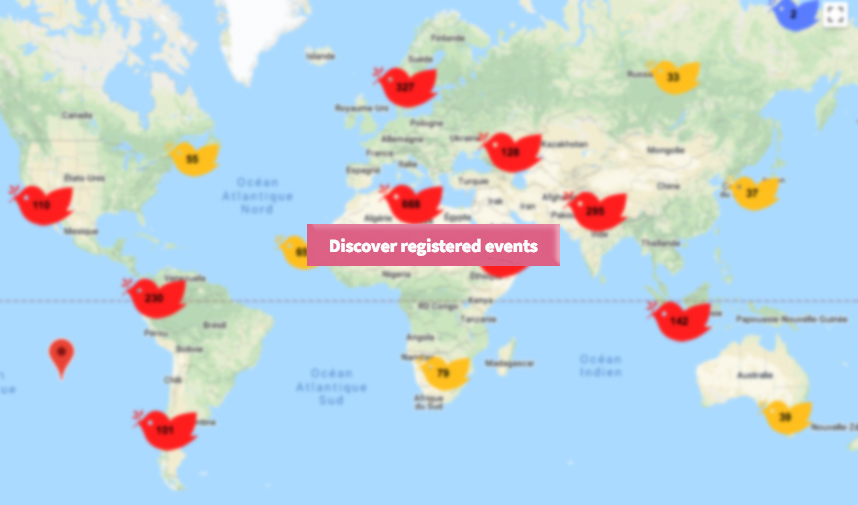This site is maintained by the UNEP/CMS Secretariat and UNEP/AEWA Secretariat © 2006 - 2022 Disclaimer | Impressum
UNEP/CMS and UNEP/AEWA Secretariat | Platz der Vereinten Nationen 1, 53113 Bonn, Germany | Tel. (+49 228) 815 2454, Fax. (+49 228) 815 2450 | Contact


World Migratory Bird Day 2019
Protect Birds: Be the Solution to Plastic Pollution!
11 May and 12 October 2019
What is World Migratory Bird Day?
World Migratory Bird Day (WMBD) is an annual awareness-raising campaign highlighting the need for the conservation of migratory birds and their habitats. It has a global outreach and is an effective tool to help raise global awareness of migratory birds, the threats they face, their ecological importance, and the need for international cooperation to conserve them. Every year, people around the world take action and organize public events such as bird festivals, education programmes, exhibitions and bird-watching excursions to celebrate WMBD. The main days for the international celebrations are on the second Saturday in May and October. The Convention on Migratory Species (CMS), the African-Eurasian Waterbird Agreement (AEWA) and Environment for the Americas (EFTA) have joined forces to strengthen global recognition and appreciation of migratory birds. This year the theme of World Migratory Bird Day is “Protect Birds: Be the Solution to Plastic Pollution!” and will put the spotlight on the impact of plastic pollution on migratory birds and their habitats.
Plastic and its harm to the environment
With an annual production of more than 300m tonnes, plastic is one of the most widely used materials in the world. What often escapes one’s attention is that the plastic is used for its man purpose for only a moment compared with its lifecycle of 20 to 500 years. Lightweight and designed to last, the discarded pieces are easily transported to ecosystems through the forces of nature causing serious threats to migratory species around the world. To make matters worse, plastic does not simply dissolve. Broken down into small particles by water, sunlight and wind, it often leads to lethal cases of ingestion and entanglement.
How does plastic affect birds?
Sadly, having wings does not help birds escape the threat of plastic. Dead chicks with stomachs full of plastic, entangled and smothered by plastic rings and nets are all too real consequences of the toll that plastic takes on birds and other wildlife.
Ingestion
Foraging behaviour makes seabirds prone to ingesting plastics. Floating on the surface of the water, covered in algae, single-use plastics such as bags, drinking straws and bottles can easily be mistaken for prey, both by shape and by smell. Unwittingly, birds feed plastic to their chicks that are even more vulnerable due to their underdeveloped organs.
In cases of ingestion, the damage caused by plastic depends on its shape. Sharp plastic particles cause immediate death by piercing internal organs. But mostly, plastic consumption leads to a chronic feeling of hunger and starvation as it gives the sensation of satiety without any nutritional value. The toxicity of chemicals coating plastics is an additional threat.
Entanglement
Layers of plastic covering wetlands lead to many cases of entanglement and trapping. Abandoned fishing gear is one of the most common causes leading to a phenomenon called ‘ghost fishing’. Caught birds are either injured and pick up infections or end up drowning. Often, trapped birds are limited in their movements and easily become prey to other animals.
What can be done to prevent the problem?
The number of seabirds dying from the effects of plastic every year is currently 1 million and growing. Existing research pinpoints the urgency of the matter: In just two decades between 1960 – 1980, the number of birds found ingesting plastic has grown from 5 per cent to 80 per cent.
Studies show that local projects on the management of plastic waste produce results in a short period of time. Thus, common sense and awareness can help to curb the giant tide of plastic. The international community needs to take urgent action to mitigate unnecessary injuries and mortality of migratory birds due to plastic pollution. World Migratory Bird Day 2019 is a unique chance to join efforts to address the serious problem of plastic pollution and to highlight its negative effects on migratory birds. Let’s unite our voices to address this rapidly growing environmental concern!
What to do to fight plastic pollution?
Reduce, reuse and recycle - Limit your use of plastic materials and replace them with eco-friendly alternatives, use and dispose of plastics sustainably
Clean up - Join clean-up activities in your area, whether at beaches or along rivers
Spread the word - Support local and global action against plastic
How can you participate?
If you are interested in organizing an event to help address plastic pollution and celebrate migratory birds, register your planned activity with us! In this way, individual events can be shared with others around the world and help inspire them to take action too.
Get Involved
Are you an individual or an organization willing to participate in a way or another in World Migratory Bird Day?
Are you planning to organize an event?
Are you interested in learning more about these birds, the challenges they face and the need for their conservation?
The new World Migratory Bird Day website is under construction and will be available soon but if you have events and already would like to register, press the registration button to enter the event's information:
Registration of Your 2019 Events
Discover registered events
Get Inspired by the Past Events
If you're interested in the history and development of WMBD, just take a look at our archive – you will find out what people have undertaken all around the world for the last 11 years!
